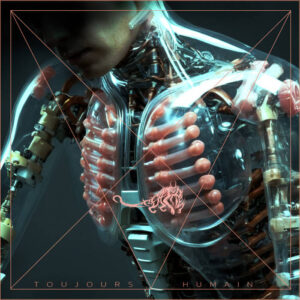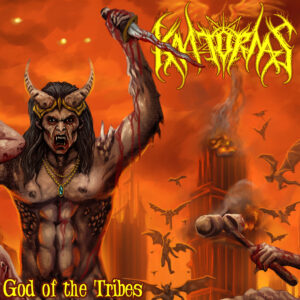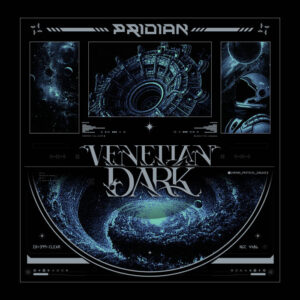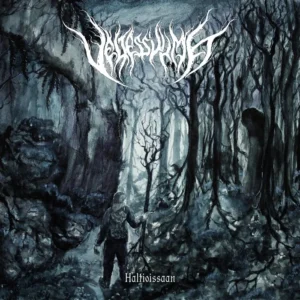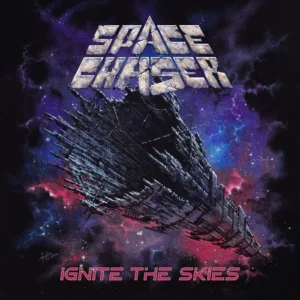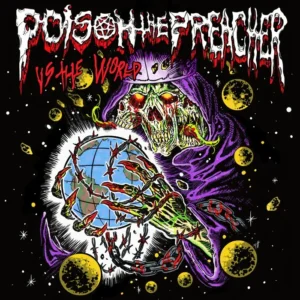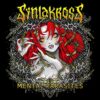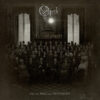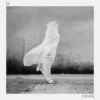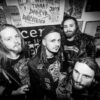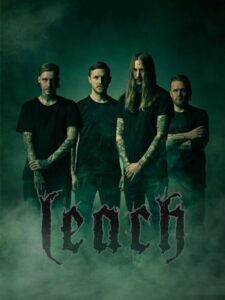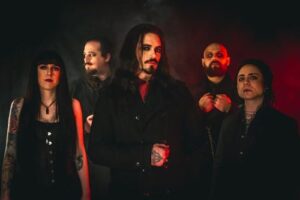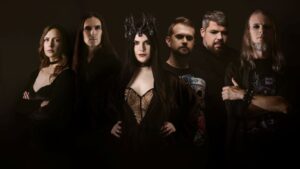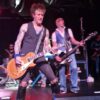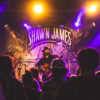Welkin Shores Burning
Autumnblaze
•
December 14, 2020
They call themselves "metal/post-rock/trip-hop/singer-songwriter," does the German duo AUTUMNBLAZE - which is to say touches of metal in some of the guitar work, a definite singer-songwriter vibe in the lyrics and vocals, and trip-hop in the mixing and arrangements. More simply, what their work is is almost genre-less, austerely beautiful, and sensitively performed. They've been in existence in one form or another since 1997; AUTUMBLAZE itself split in 2006 and reformed two years later. They are obviously supremely confident in their mission on their latest, "Welkin Shores Burning."
The instrumental "Welkin" establishes the album's signature musical patterns: a lightly strummed electric guitar melody, Markus' distinctive voice (here in a wordless vocal), and the addition of undermixed electric guitar riffing that brings a fascinating edge, a certain welcome "metal" touch, if you will. Its simple melody is repeated, then another guitar melody is added, then another layer of the riffing, then another wordless vocal. Each time the melody is gone through, another dimension is folded in; each time before this happens is a brief pause, like an inheld breath, as if to prepare us for the next layer.
"Planets" starts the same way, and we hear Arisjel's drums for the first time - the intimate mix brings them nicely forward, especially the cymbals, but they're never intrusive or disruptive. The chorus is so lovely - "Planets can't breathe without a sun/They need bright rays to exist/You and me, we are tiny planets/We need bright rays to exist." It reminds us of our temporary status, how tenuous our grip is on this world ("One billion perfect views/Yet we can't climb the truth," how we all think we're right; "A broken star could kick us from our throne," like it could all be over in an instant). The "bright rays" could be hope - as planets need the sun, which is a form of hope, so too do people. The bridge is a variation of the melody and deconstructed versions of the verses and the chorus - just a few words from them, like "planets' and "bright rays."
"Explosions" begins with more light, echoing electric guitar, Markus' fingers audible on the strings. It's reminiscent of PINK FLOYD, sober in its content, but soothing and lulling in its sound. There are little touches of a theme - the concept of "fire" might mean trials and tribulations, difficulties, "You have seen me tonight/Standing close to the fire" and "First I was just afraid/To enter the fire." Perhaps there's something existential in the line from the chorus, "Explosions in the sky/ Open up the gates to life," like explosions created the universe and similar explosions in our lives change us. And the lines, "Oh I don't know/Maybe you know" might be saying we're all helpless but we can learn from each other.
"One Breath" again starts as the others, with an electric guitar melody and touches of cymbals. Rather than being boring, the similar musical foundation each track has sets the mood for the entire effort and gives it continuity and a musing, contemplative quality, almost like a classical piece with a series of movements. This is just one verse - when it ends the first time, it builds into an instrumental section that grows in intensity. This is perhaps the heaviest track, but again it's not jarring; its heaviness occurs organically. Markus is a tasteful, dainty player, letting it accompany his vocal perfectly, neither one dominating the other. Thematically, it hints at the butterfly effect ("One breath will raise a storm/Forging fires you've never seen before/One breath will raise a spark").
"The Burning Sea" is even more stripped down, just Markus' poignant, aching voice and that wistful guitar. An ensuing solo plays off the melody of the chorus, adjusting it just slightly, as Markus repeats the title underneath. The first verse kind of says it all, not just about the song, but about their music as a whole - "Sometimes you find music pure and true" - and that's indeed what this is, "music pure and true." It may also be saying that in adversity, we find strength ("In the blackest of fires you see everything/Everything you need" and "In the blackest of stars we saw everything/Everything we needed"). The parallelism of the two choruses might build on that idea - "Tortured by the burning sea/We fall through endless nights/Yearning for the deepest moment/We are cursed and bound," then, "Sheltered by the burning sea/We dream of endless nights/Yearning for the deepest moment/We are lost and found." So it seems the second one resolves the first, that we have at last found that inner strength.
Markus starts "Leaders" right away with his voice and guitar, going into a rather pointed first verse that has a hopeless, resigned quality - "Empty words, fading islands/We have drowned inside the ocean/Hollow fields, no direction," like we have lost our way, our purpose. The chorus notes, "We are leaders ... of a breaking galaxy" (we might be in charge, but we've ruined it), and the bridge continues, "It's a blind flight, yet it's just/The only flight we have/It's a blind dream, yet it's just/The only dream we can dream," as if to say we're doomed, but this is all we have, there are no alternatives. And again he deconstructs the chorus in the bridge and the fadeout, changing the key and the rhythm in the process.
"Autumn Wings, Behold" is softer, slower, more tender, Markus' voice barely audible. The last line of the verse builds just imperceptibly into heavier drumming and stronger guitar. It speaks of the seasons ("Let us taste and sing/Sweet and blooming spring" and "Leaves of red and gold/Autumn wings, behold"), but it's also a call to action, as the chorus develops and strengthens, getting more and more insistent but not overbearing, as he urges, "Burn all memories/Free yourself from the barriers in your mind."
"Flamedoves" has a more upbeat start, with a groove set by the drums and electric. It slows in the verse, but picks up again before the chorus, then it lengthens out - they play with rhythms most effectively here. Midway through, the solo and bridge slow it down and guide it to the end on his repeated line, "Flamedoves will cry/When tunes are fading in the end," which is kind of fitting, isn't it? This is pure mysticism rooted in nature, just deeply poetic images that stir the imagination, especially the second verse ("Taste my crystal feathers/Forged in soulspawn tragedies/Join the firedances/Bathe in living symphonies") and lines like, "I hear flowers breathing" and "Hear the cosmos roaring/With our soulspawn melodies."
The final track, "Shore," sung in German, starts as do the others, with a gentle lilting rhythm, the whispering vocals almost an afterthought. The melody just repeats anew each time, segueing into wordless vocals and a tribal low drumming. It's very like the opening track in how it adds layers each time through the melody; it ends on the same vocal and drumming as it began. "Welkin Shores Burning" is "melancholic," yes, as the duo says in their Facebook bio, but there's an optimism to it, a certain romanticism as well. It's also just plain pretty, and there's nothing wrong with that at all, especially in these dark, stressful, strange times.
10 / 10
Masterpiece
Songwriting
Musicianship
Memorability
Production
"Welkin Shores Burning" Track-listing:
1. Welkin
2. Planets
3. Explosions
4. One Breath
5. The Burning Sea
6. Leaders
7. Autumn Wings, Behold
8. Flamedoves
9. Shore
Autumnblaze Lineup:
Markus Baltes - Vocals, Guitar, Bass
Andreas Schuler - Guitar
Arisjel - Drums
More results...
